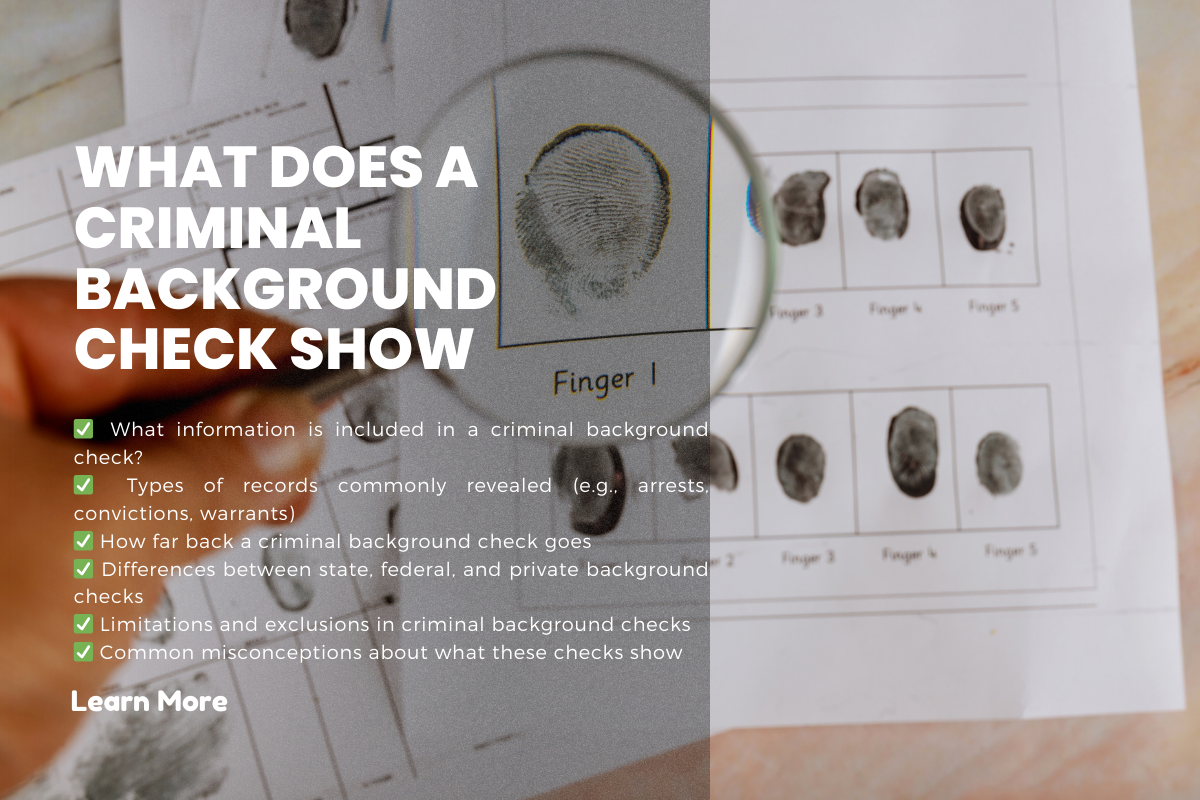
Table of Contents
ToggleUnderstanding What a Criminal Background Check Shows
A criminal background check is a crucial tool used by employers, landlords, and other organizations to verify a person’s criminal history. These checks are often conducted to ensure that an individual is trustworthy, responsible, and eligible for a position, rental, or other opportunity. They help confirm the accuracy of the applicant’s statements and provide an in-depth look at their criminal record, if any.
What is a Criminal Background Check?
A criminal background check is an investigation into an individual’s criminal history, typically performed by an employer, landlord, or other organizations. It involves searching public records for information related to the person’s criminal behavior. Depending on the nature of the check, it can reveal past convictions, pending charges, arrests, and other legal matters. The information obtained is used to assess the individual’s suitability for a job, housing, or other purposes.
What Information Does a Criminal Background Check Show?
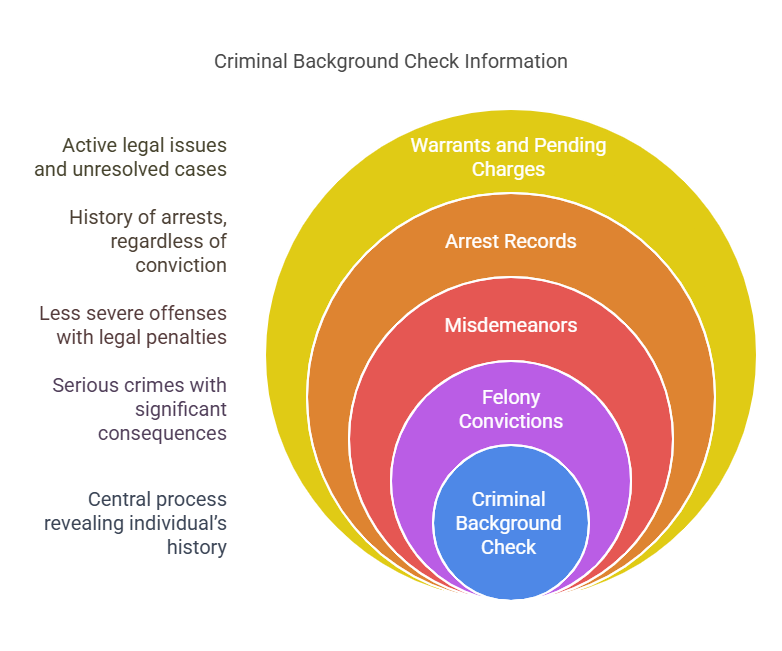
Criminal background checks can provide a wide range of information, depending on the jurisdiction and the specific purpose of the check. Below are some common types of information that may be revealed during a criminal background check:
1. Felony Convictions
Felonies are serious crimes that often result in lengthy prison sentences. A criminal background check can reveal whether an individual has been convicted of a felony offense. Felony convictions typically have a more significant impact on an individual’s ability to secure employment or housing due to the severity of the crime.
2. Misdemeanors
Misdemeanors are less severe offenses than felonies but can still result in criminal penalties, such as fines, probation, or jail time. A background check can disclose whether the individual has been convicted of any misdemeanor offenses, which could affect their eligibility for certain opportunities.
3. Arrest Records
An arrest record shows whether an individual has ever been arrested, even if they were not convicted of a crime. Arrest records may appear on a background check, but the mere existence of an arrest does not imply guilt. Employers and landlords may need to assess the context surrounding the arrest, especially if charges were dismissed or the individual was not convicted.
4. Warrants
A criminal background check may reveal if an individual has an active arrest warrant. Warrants typically arise from the failure to comply with court orders, such as missing a scheduled appearance. An outstanding warrant can have serious implications, especially in the context of hiring or renting property.
5. Pending Charges
In some cases, a background check can show whether an individual is currently facing charges that have not yet been resolved in court. Pending charges could indicate that a person is involved in ongoing legal matters, and some employers or landlords may consider this information when making decisions.
6. Sex Offender Registries
Sex offender registries are databases that track individuals convicted of sex crimes. These records are often accessible to the public and may appear in a criminal background check, depending on the jurisdiction. Employers and landlords may use this information when making decisions about whether to hire or rent to an individual.
7. Other Legal Records (if applicable)
A background check may also reveal additional legal records, such as restraining orders, juvenile offenses, or probation violations. The types of records included can vary based on the state or country in which the check is performed.
What Do Employers, Landlords, and Others Look for in a Criminal Background Check?
Different organizations may have varying priorities when it comes to what they look for in a criminal background check. However, the common goal is to assess the risk posed by an individual and whether their past criminal history aligns with the expectations of the position or opportunity.
Employers:
- Employers typically look for any history of felonies, violent crimes, theft, or fraud that could indicate a lack of trustworthiness, responsibility, or character.
- They also focus on whether the individual has been convicted of crimes that would directly affect their ability to perform job duties or interact with customers, clients, or colleagues (e.g., a history of embezzlement for a financial position).
Landlords:
- Landlords often look for past offenses that could affect the safety or wellbeing of other tenants or the property, such as violent crimes or drug-related offenses.
- They may also check for any history of eviction or disputes with previous landlords to assess a potential tenant’s reliability.
Other Organizations:
- In the case of background checks for volunteer positions, government-related work, or even adoption, the organization may look for specific offenses relevant to the nature of the work, such as child abuse or domestic violence convictions.
Criminal background checks help to ensure that individuals with concerning criminal histories are not placed in environments or roles where they could pose a risk to others or themselves. Understanding what a background check reveals is essential for both applicants and those conducting the checks.
How Criminal Background Checks Are Conducted
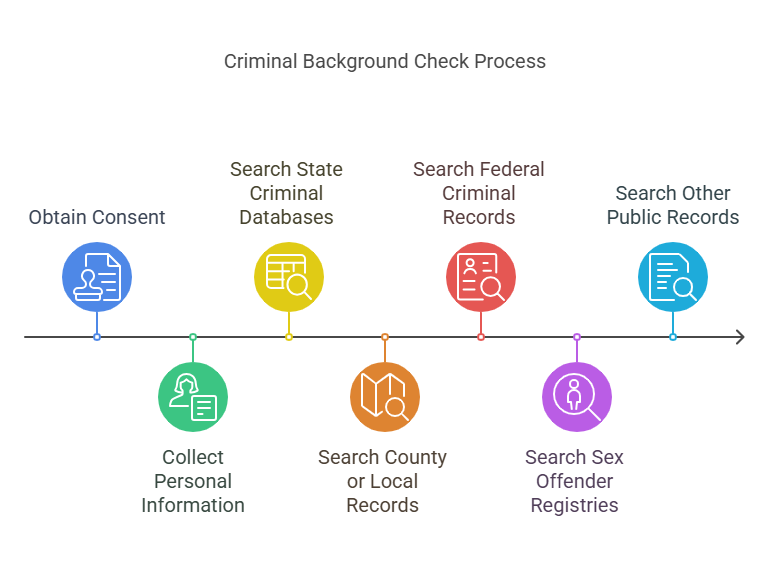
Conducting a criminal background check involves several important steps, ensuring that the results are accurate and relevant to the purpose at hand. Whether you are an employer, landlord, or someone simply curious about the process, understanding how criminal background checks are conducted can help you navigate the complexities of obtaining this information.
How Are Criminal Background Checks Conducted?
The process of conducting a criminal background check typically involves a few basic steps. These steps may vary depending on whether the background check is performed by an individual, employer, or third-party service, but they generally follow a standard procedure.
1. Obtaining Consent
Before a criminal background check can be conducted, the individual being checked must give their consent. In most cases, this consent is obtained through a signed release form, especially for employment-related checks. This is required by law under the Fair Credit Reporting Act (FCRA), which governs the use of consumer reports (including background checks) in the United States.
2. Collecting Personal Information
Once consent is granted, the next step involves gathering the necessary personal details about the individual being checked. This typically includes:
- Full legal name
- Date of birth
- Social Security number (for deeper checks)
- Address history (if necessary)
This information helps ensure that the criminal background check is accurate and that it specifically pertains to the correct individual. The more detailed the personal information, the more comprehensive the results will be.
3. Searching Criminal Databases
Criminal background checks are primarily conducted through the following sources:
State Criminal Databases
Each state has its own criminal records database, which contains information on arrests, convictions, and warrants within that state. These databases are usually maintained by state law enforcement agencies and are the most commonly accessed sources for criminal records in that state.
County or Local Records
In addition to state records, local county courts and municipal databases may contain criminal information for offenses committed within their jurisdiction. These records are often accessible through the local police department or county clerk’s office.
Federal Criminal Records
Some criminal background checks, especially those for individuals with a national or international presence, may include a search of federal criminal records. Federal records may include convictions for federal crimes such as drug trafficking, money laundering, and other serious offenses.
Sex Offender Registries
Criminal background checks may also search national or state sex offender registries, which are publicly available databases that track individuals convicted of sex-related crimes. These registries are usually updated regularly to reflect the most current information.
Other Public Records
Depending on the scope of the background check, it may also include searches for civil court records, bankruptcies, liens, or judgments that could affect an individual’s credibility or reliability.
State-Specific vs. Nationwide Criminal Background Checks
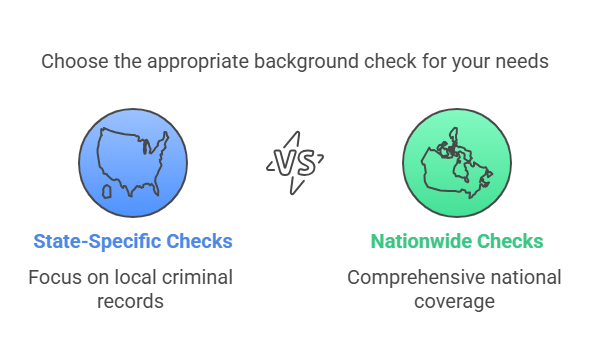
Criminal background checks can be conducted on both state and national levels. The type of check conducted depends on the requirements of the employer or organization requesting the background check.
State-Specific Background Checks
- State checks are typically focused on criminal records within a particular state, and they are the most common type of background check. They may include felony convictions, misdemeanor records, arrest records, and other state-level offenses.
- State-specific checks are ideal for employers or landlords who want to verify an applicant’s criminal history within a specific geographic region.
Nationwide Background Checks
- Nationwide criminal background checks search for criminal records across all 50 states. This type of check is broader and can provide a more complete history of an individual’s criminal activity.
- Nationwide checks are beneficial for organizations hiring employees who may work in multiple states, or for individuals who have lived in various states over time.
However, it’s important to note that a nationwide criminal background check may not capture all records, as some records may not be available at the national level. This is why many background checks combine federal, state, and local records to ensure comprehensive coverage.
Background Check Reports and Their Variations
The criminal background check report that is generated will vary depending on the information sources and the scope of the check. The report will typically provide details such as:
- The types of crimes committed (felonies, misdemeanors, etc.)
- Dates of convictions, arrests, or pending charges
- Sentencing information, including fines, probation, or incarceration (if applicable)
- The name of the law enforcement agency that handled the case
- Any other relevant legal details
Importance of Compliance with Laws
It’s essential for those conducting criminal background checks to comply with federal and state regulations to ensure that the process is fair and legal. The Fair Credit Reporting Act (FCRA) is one key law that regulates how background checks are performed and how the information is used. Employers, landlords, and other parties conducting criminal background checks must follow FCRA rules to protect the privacy of individuals being checked and ensure that the data is used only for authorized purposes.
In Florida, for example, the Florida Department of Law Enforcement (FDLE) provides access to criminal records, but there are specific rules regarding who can request this information and under what circumstances.
How rapidhiresolutions Helps in the Process
www.rapidhiresolutions.com provides reliable background screening services, offering both employers and individuals the resources to conduct criminal background checks. Their services are designed to help ensure compliance with legal regulations while delivering thorough and accurate background check reports. Rapid Hire Solutions also assists in employment screenings, which include criminal record checks, thus streamlining the hiring process for businesses.
Legal Aspects, FAQs, and Conclusion
Understanding the legal aspects of criminal background checks is crucial for employers, landlords, and individuals who are conducting background checks. Laws surrounding these checks are designed to protect both the person being checked and the entity conducting the check. Below, we’ll explore the legal framework, common questions about criminal background checks, and summarize the key takeaways.
Legal Aspects of Criminal Background Checks
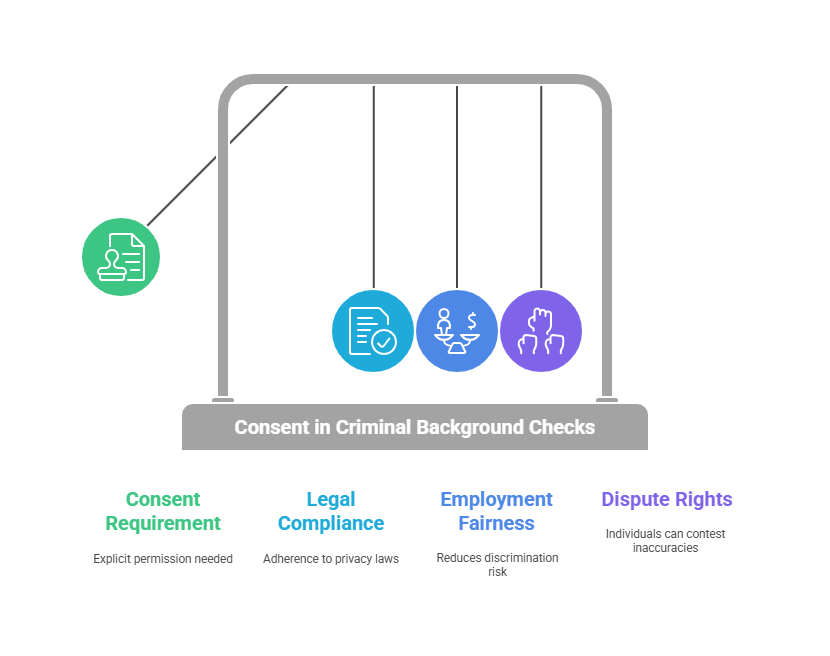
Criminal background checks are subject to various legal considerations that govern how, when, and why they can be conducted. Below are some of the most important legal factors to keep in mind.
1. Privacy Rights and Consent
One of the most important legal considerations in conducting a criminal background check is obtaining explicit consent from the individual being checked. Under the Fair Credit Reporting Act (FCRA), individuals must give written consent before their background can be checked, especially if the results will be used in employment decisions.
Employers and other entities are also required to inform the individual of their right to dispute any inaccurate information found in the background check.
2. What Employers Can Ask
While employers are generally allowed to conduct criminal background checks, there are limitations on what they can ask. The Equal Employment Opportunity Commission (EEOC) provides guidelines to help employers avoid discrimination based on criminal history. For example:
- Ban the Box: Many states and cities have implemented “ban the box” laws, which prevent employers from asking about a candidate’s criminal history on the initial job application. Employers may only inquire about criminal history after a conditional job offer is made.
- Relevance to the Job: Employers are required to consider the nature of the offense, the time that has passed, and how it relates to the job position. For example, a minor misdemeanor from 10 years ago may not be as relevant for a position in customer service as it would be for a role that involves handling money.
3. Criminal Records and Employment Decisions
Criminal records can have a significant impact on employment decisions, but employers cannot automatically disqualify candidates solely based on their criminal background. Employers must evaluate the nature of the offense, how long ago it occurred, and the relevance of the offense to the job in question. Additionally, many states have laws that limit how far back employers can look into criminal history (typically 7 to 10 years).
4. State and Federal Laws
Different states have different regulations regarding criminal background checks, particularly with respect to what types of criminal records can be accessed. For example:
- Florida: In Florida, the Florida Department of Law Enforcement (FDLE) oversees the criminal background check process, and access to criminal records is tightly regulated.
- Federal Law: The FCRA and other federal regulations apply uniformly across the United States, but each state may have additional requirements or limitations.
Frequently Asked Questions (FAQs)
What is the difference between a criminal background check and a criminal record check?
A criminal background check is a broader term that may include various types of records, such as felonies, misdemeanors, arrest records, and warrants. A criminal record check, however, typically focuses only on an individual’s conviction history.
How far back does a criminal background check go?
This depends on the jurisdiction and the type of check being performed. In some cases, criminal background checks can go back as far as 7 to 10 years, though certain serious offenses (such as violent crimes) may be included indefinitely.
Can an employer ask about a criminal record during a job interview?
In many states, employers are prohibited from asking about criminal records on a job application (ban the box laws). They may only inquire after extending a conditional offer or during the interview process, and the information must be evaluated carefully to ensure it is relevant to the position.
How can I dispute errors in my criminal background check?
If you find inaccuracies in your criminal background check, you have the right to dispute them. You should contact the company that performed the background check and provide supporting documentation to prove the error. The company is required by law to investigate the dispute and correct any inaccuracies.
Can a criminal record affect my ability to rent a home?
Yes, landlords often conduct criminal background checks to determine whether an applicant has a history of offenses that may pose a risk to other tenants. However, the same laws governing employment decisions apply to rental applications. Landlords must consider the relevance of the offense, its timing, and whether it directly impacts the safety and well-being of other residents.
Conclusion
Criminal background checks are an essential part of the hiring, renting, and screening process for many employers, landlords, and other organizations. Understanding what a criminal background check shows and how it works is crucial to ensuring that the process is conducted fairly and legally.
By ensuring compliance with state and federal laws, obtaining proper consent, and following best practices for background checks, employers and other entities can make informed decisions that are fair to individuals while protecting their business or property. Whether you’re an individual conducting a self-check or an employer looking to hire, it’s vital to understand the scope of the information a criminal background check can reveal and the legal implications involved.
Conducting thorough and accurate criminal background checks is a critical step in creating safe, secure, and legally compliant hiring practices or rental decisions.
